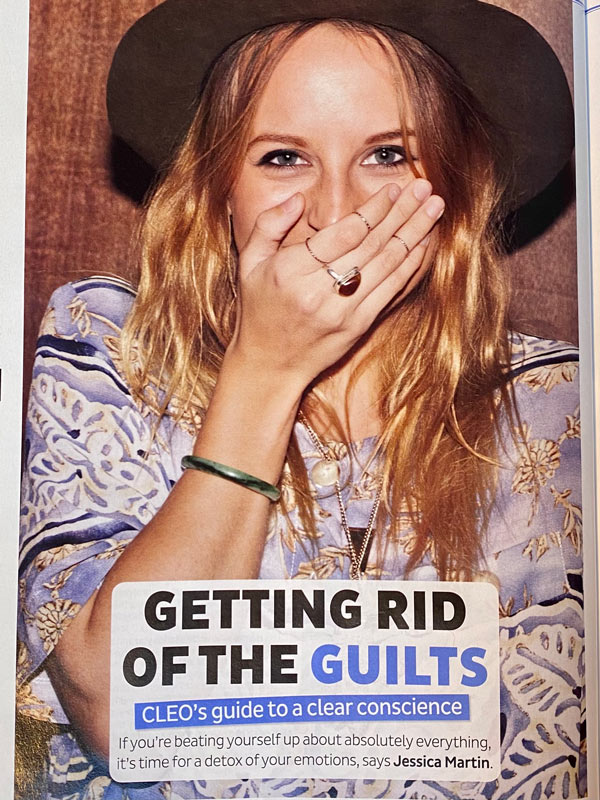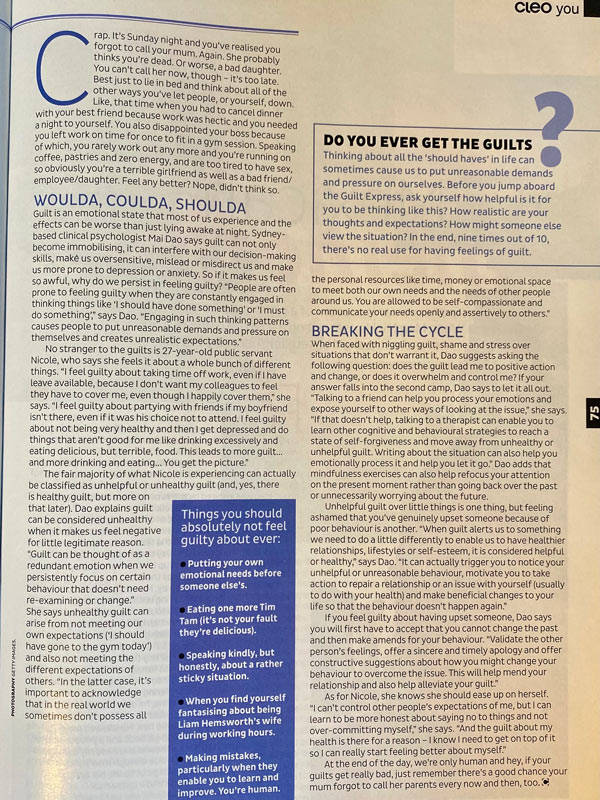We were invited by Jessica Martin to share our knowledge about guilt and to provide tips for managing guilt to Cleo Magazine readers. View the article and our full tips below:


Online article link: https://myreadingroom.online/en/live/life-style/cleo/y604zk70w
Tips for managing feelings of guilt
Who tends to experience feelings of guilt?
Guilt is an emotional state experienced by most people and typically arises when we experience internal conflict about having done something that we should not have, or alternatively not having done something that we should have. When feelings of guilt become intense or persistent it can be difficult to endure, and can impact people’s functioning. People who are more vulnerable to intense or prolonged experiences of guilt include those who place very high expectations on themselves and those who are prone to persistent worry and self-doubt.
Is guilt a helpful or unhelpful emotion?
Guilt can be considered ‘healthy’ or ‘helpful’ when it alerts us to something that we need to do differently to enable us to live consistently with our values and have healthier relationships, lifestyles or self-esteem. Guilt can be considered ‘unhealthy’ or ‘unhelpful’ when it makes us feel negative for little legitimate reason. ‘Unhealthy’ or ‘unhelpful’ guilt can be considered a redundant emotion, as persistently focusing on behavior that does not need to be re-examined or changed can be debilitating rather than helping you to grow and mature. ‘Unhealthy’ or ‘unhelpful’ guilt can become immobilizing, interfere with your decision making, cause you to be over-sensitive or over-compensate, mislead or misdirect you and make you more prone to depression or anxiety symptoms.
Often we feel guilty because we think we “should have” done something. How can we combat the “should haves”?
People are often prone to feeling guilty when they constantly engage in thinking that “I should have” done something or “I must” do or be something. Engaging in such thinking patterns causes people to put unreasonable demands and pressure on themselves and creates unrealistic expectations. For example: “I should always get things right the first time” or “I must never disappoint other people”.
One way to manage ‘Should-ing’ and ‘Must-ing’ tendencies is to challenge these thoughts by asking yourself things such as:
- What evidence is there that my thoughts or beliefs are true?
- What evidence is there against my thoughts and beliefs?
- Are there facts that I am ignoring or that I have overlooked?
- What other explanations could there possibly be?
- How realistic are my thoughts or expectations?
- What are other ways of viewing the situation?
- How might someone else view the situation?
- Realistically, how likely is it going to happen?
- How helpful is it for me to think this way?
Are there any positive messages or outcomes we can take from guilt? For example, if we have done something hurtful that we need to make amends for?
In this given example where you may have hurt another person, healthy guilt might trigger you to notice your unhelpful or unreasonable behavior, motivate you to take action to repair this relationship rupture and make changes so that it does not happen again.

How do we manage guilt that comes from not living up to other people’s expectations of us?
Guilt can arise from not meeting our own expectations but it can also arise from not meeting the expectations of others. It is important to acknowledge that we sometimes don’t possess all the personal resources such as time, emotional capacity or money to meet both our own needs and the needs of others. Try to be self-compassionate and remind yourself that you would likely be compassionate towards others, if they had limited capacity to be there for you and the roles were reversed.
What are some helpful tips to talk about our feelings of guilt with the person it pertains to?
If you have done something wrong or hurtful towards someone, you will firstly have to accept that you cannot change the past but you can make amends for your behaviour, if and when it’s appropriate.
- Engaging in open and assertive communication is helpful when trying to manage expectations or discuss feelings of guilt.
- It can be helpful to use “I feel…” statements and refer directly to the situation involved e.g. “I feel disappointed in myself for criticising you in the car earlier.”
- It can be helpful to validate the other person’s feelings, offer a sincere and timely apology and acknowledge your role in the situation e.g. “you must have felt shocked and hurt, I am deeply sorry, I could’ve asked you more calmly”.
- It can be helpful to offer constructive suggestions about how you might change your behavior or overcome the issue e.g. “I am trying to be more aware of my stress levels and learn more helpful ways to deal with stress so that this does not happen again.”
- Lastly, asking for feedback can be helpful e.g. “is there anything else that you would suggest that I do.”

What are some strategies we can learn to release our guilt or forgive ourselves?
- The first step is to identify whether the guilt is ‘healthy/helpful’ or ‘unhealthy/unhelpful’. You can simply ask yourself the question: Does the guilt lead me to positive action and change or does it overwhelm me and control me?
- Writing about the situation can help you emotionally process it and help you let go of the guilt and forgive yourself.
- Engaging in mindfulness exercises can help you refocus your attention on the present rather than going over the past or unnecessarily worrying ahead into the future.
- Challenging unhelpful thoughts (as mentioned above) can lead to greater flexibility in your beliefs and expectations, self-compassion and therefore reduce feelings of guilt.
- Talking to another person can help you process your emotions and expose you to other ways of looking at the issue.
- Talking to a Clinical Psychologist can help you to learn other cognitive and behavioral strategies to manage guilt and help you become more self-compassionate to improve your quality of life.
Conclusion
Guilt is an emotion that can help people to live more consistently with their values. However, if it becomes intense or persistent it can be associated with depression or anxiety.
If you would like some support with managing guilt, depression or anxiety, contact us at https://www.resiliencepsychology.com.au/contact
We provide Clinical Psychology services in Adelaide for adult individuals and couples, and provide Telehealth services Australia-wide.
